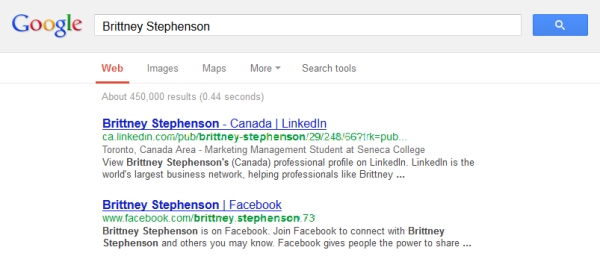Before graduation, most students will receive some form of advice on searching for a job. Whether it’s from a career counsellor, a professor, or a parent, students are usually told about the importance of things such as networking, writing personalized cover letters, and dressing for success. However, with over 90% of hiring professionals using social media sites to screen prospective employees, relying solely on your application to make a good first impression is no longer enough. Students must be aware of their online reputation, and the message that it’s sending to prospective employers.
Don’t let the news that employers may be looking you up online scare you. Instead, use it as an opportunity to make yourself stand out from the crowd.
“Hiding” Online Isn’t the Answer
Effectively managing your reputation means more than maximizing all of your security settings. While you should certainly start by visiting your Facebook profile to see what type of content is visible to others, hiding behind a fake name can have consequences. Kashmir Hill warns that it is increasingly “expected that everyone is on Facebook in some capacity,” and that it can look quite suspicious if someone isn’t using the site. Similarly, a locked Twitter account where tweets aren’t visible to the public may make employers wonder what exactly you have to hide.
Take Control of Your Reputation
Make your online reputation work for you. 68% of hiring professionals surveyed in a Reppler study responded that they have hired a candidate because of what they saw about them on a social networking site. Get a sense of what others find when they search for you by Googling your own name. Managing your reputation involves not only what you’re sharing, but also what others are sharing about you, so keep on top of your personal brand by setting up a Google Alert that will email you when new search results appear for your name. Students can also sign up for the free service provided by Reppler, which monitors your social media presence across Twitter, Facebook, and LinkedIn to identify potential issues and risks. Reppler can also show you how you are likely perceived across your social networks, such as whether you use a positive or negative tone, and the words you use most often.
Building a positive online reputation requires an investment of your time, so don’t expect it can be done overnight. Show prospective employers that you are interested in your chosen field of work by using Twitter to share relevant articles and information with your followers. Take advantage of the “Recommendations” feature on LinkedIn, which allows past employers, co-workers, and peers to write brief recommendations about your work. If you don’t have a LinkedIn profile, my advice is to sign up for one right away! The professional social network is free to join with a basic account, and is a great platform for prospective employers to check out your education and work or volunteer history. (If you want to enjoy LinkedIn’s advanced features a Job Seeker account starts at US $15.95 / month, but from my experience the basic account is more than enough for the average student.) I have also created a Flavors.me page (a service similar to About.me) that acts like digital business card: it features a brief introduction to who I am and directs people to my Twitter and LinkedIn pages.
Online = Forever
Remember that the things you post online shape how other people perceive you. What might seem like a fun or harmless post today could resurface in the future with damaging results. Reputation management shouldn’t end as soon as you find your first job. Not only will a positive online reputation help you the next time you need to search for a position, but it’s also important to ensuring you keep the job you do have. An employee is a representative of the company they work for, and any inappropriate photos or comments you post not only reflect poorly on you, but also on the company.
Sources:
“Compare Accounts.” LinkedIn.
Hill, Kashmir. “Beware, Tech Abandoners. People Without Facebook Accounts are ‘Suspicious.’” Forbes. June 8 2012.
“Learn More.” Reppler.
Swallow, Erica. “How Recruiters Use Social Networks to Screen Candidates [Infographic].” Mashable. Oct. 23 2011.
“Use Google Alerts to Keep Tabs on Your Brand, Your Competitors and Pamela Anderson.” Ethnicomm – The Blog. June 23 2008.


Reblogged this on purdynick and commented:
whether or not you agree that this is how it SHOULD be, this is how it IS…
Pingback: Facebook still on top of all social networks so says a survey
Pingback: A lesson in personal branding: hiding online is no longer an option. | pugtato